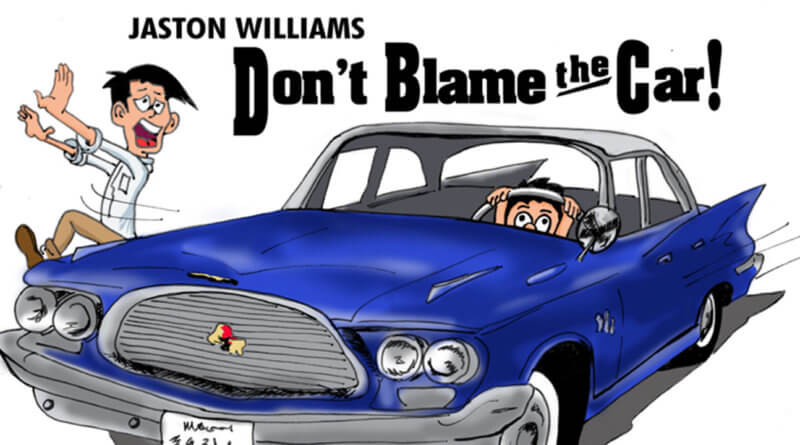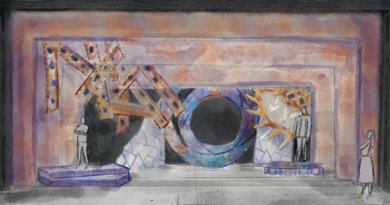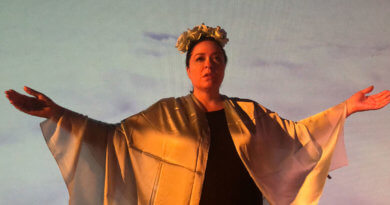Exclusive Interview: Jaston Williams On ‘Don’t Blame the Car!’
 Making a welcome return to the Classic Theatre this month is performer, comedian and Greater Tuna co-creator Jaston Williams, who is bringing his new solo show, Don’t Blame the Car!, to the Alamo City.
Making a welcome return to the Classic Theatre this month is performer, comedian and Greater Tuna co-creator Jaston Williams, who is bringing his new solo show, Don’t Blame the Car!, to the Alamo City.
Mr. Williams took the time to talk with ArtScene SA about the piece, as well as his thoughts and affectionate reminiscences of San Antonio.
Artscene SA: So you just can’t stay away, eh?
Jaston Williams: Oh, gosh. You know, I’ve got San Antonio in the blood, I really do.
Where does this piece fit in with the history of Jaston Williams?
Well, a lot of this piece — in fact, nearly all of it — deals with my family. I try to explain to people that I’m not the wildest spirit in my family. They have a problem believing that, but I’m a distant second to my older brother, who was a carbon copy of Yosemite Sam [laughs].
He really was. He was five foot two in boots, and the toughest little creature I’ve ever known. He was the ultimate Texan. I’ve never known anything like him. He passed away two years ago, so with the last part of this piece, I just needed to say goodbye to him and all of his legendary behavior. So the last part is called “An Ode to Yosemite Sam.”
He was an actor and God knows what else. We were in Fort Worth one time, doing a play called The Foreigner, and after the show, this big old cowboy came up to me and said, “I’d like to talk to Corky Williams. I think I know him.” I said, “He’s my brother. I’ll go get him.” I went to his dressing room and said, “Corky, there’s a big, tall cowboy out there who says he knows you,” and he asked, “Does he seem hostile?” I said, “No. He seems very, very friendly.” So he said, “Well, come on out. Cover my back. I may need you.”
So he comes out and this guy looks down — Corky’s 5’2″ and this guy’s 6’6″. He’s looking up at this guy and the guy says, “Are you the Corky Williams who was found naked in the lobby of the Blackstone Hotel during the Fort Worth Stock Show in about 1957?” Corky thought for a second and said, “It rings some kind of a bell”!
That’s my bloodline. I tell people that the reason I adopted a child from China was because I knew my gene pool. You know… what was in there. I wasn’t going to risk passing that on [laughs]. But Corky was a great inspiration in my life. [Tuna co-creator and co-star] Joe Sears asked me one time, “Did you and Corky get your temper from your mother or your father?” I stopped for a second, and I said, “Both!” That those two people would get together and fall in love and procreate…it’s kind of frightening. But a bunch of humor came out of it.
A lot of this piece is about the cowboy history in my family. My grandfather was a real West Texas cowboy; he was one of the founders of Lamb County, before there was even a road out there. We are ancestors of cowboys. I may dress up nice and wear Armani, but I have an inner cowboy inside me that can ride out at the spur of the moment and do a lot of damage!
I just grew up in such an interesting time. In Texas in the mid-1960s, you could get a driver’s license when you were 14 years old. It was a holdover from the farm culture because, in so many small towns, kids worked on farms and they needed a license. My first driver’s license read, “14 year old, 4’11”, 82 pounds” — and I drove a Chrysler New Yorker! One of the biggest cars ever made, and it had a push-button gear system. There was a button that said “drive,” so you just pushed it, and you took off like a rocket. I sat on three bedpillows so that I could see between the arc of the steering wheel and the hood. Somebody called my mother one day and said, “Your car just went by my house and there wasn’t anybody in it!” So that was me…
So this is the San Antonio premiere.
Yes, it’s the anywhere premiere. It’s become kind of a tradition for me to come to San Antonio this time of year and do something. I hadn’t planned to do it this year — I had just finished a novel. But I thought, “It’s coming up to summer, and I always go to San Antonio and Galveston with something new. Let’s put a piece together. ” So I pulled two pieces that I had done before, but never in San Antonio. Then I wrote the eulogy for my brother…and that’s kind of where it goes.
And you know, I have such a history with that city. I have such an affection for San Antonio, and especially for that part of town where the Classic Theatre is. My great aunt lived over there. She was Dean of Girls in the 1940s at Jefferson High School. She was a grand southern lady, and I spent a lot of my childhood when I was in San Antonio in that neighborhood. Years later, when I moved back, I lived all over San Antonio — 23 different places in seven years. I can get you pretty much anywhere around town.
What’s the meaning of the show’s title?
It’s two stories, actually. One is my father teaching me how to drive. We had a little tiny Ford Falcon in the ’60s. He found out that my mother was teaching me and said, “Write down everything she told you on a piece of paper…and burn it.” He took me out and taught me how to drive a standard shift, which was just hysterically funny. I was so weak and so small that we just lurched down the street with my father screaming and crying, begging me to turn off the radio. He said, “I don’t want to die listening to the Beatles!” I had such an affection for that car, though.
Another thing is that with the success of the Tuna shows, I’ve been fortunate to be able travel a lot. I made a couple of trips to Argentina and Buenos Aires, my favorite city in the world. I’m a student of history, so I’d studied a lot about Argentina. There was a very dark period in that country during the mid-seventies and early eighties when there was a military junta. They cracked down on anything they didn’t agree with. And about 35,000 people completely disappeared. You could be abducted for owning a book or writing a poem or singing a song — anything they deemed might not be on the up-and-up. The cars that would arrive at your door were Ford Falcons, and they didn’t have license plates. They were like military vehicles.
When I went to Argentina some years ago, those cars were still around. They’d been repainted and everything, and had kind of worked their way down into the populace. You couldn’t go anywhere without seeing one. Going to a country that had been under a dictatorship where certain unwise people defined what patriotism is is a very dangerous thing. It can get way out of hand. Seeing the cars bothered me, and I just wanted to know more about what had gone on.
I don’t want to give it away, because the title really comes from the conclusion of this scene.
The audiences will have to come to find out.
Yeah. A car doesn’t have a conscience. It can be used however you want to, and I decided to remember it as I wanted to, which is an innocent and beautiful thing. I would love to go back to Argentina and take my husband. It is an amazing place. Again, they survived a real nasty, nasty experience…and they came out of it. And that makes me very proud of them.
And they’re funny as hell. The Argentines are hysterically funny. Everybody’s got two psychiatrists, you know? They’re a fascinating people. They speak English with an Italian accent, they live in French-looking houses and they wish they were English!
But anyway, this was a story I wanted to tell. There are the two stories combined, and it comes out to a very peaceful and loving place.
Don’t Blame the Car! plays Thursday and Friday, June 27 and 28, at 8:00 p.m.; Saturday, June 29 at 2:00 and 8:00 p.m.; and Sunday at 2:00 and 7:00 p.m. at the Classic Theatre, 1924 Frederickburg Road. Reservations can be made online or by calling the box office at (210) 589-8450.




